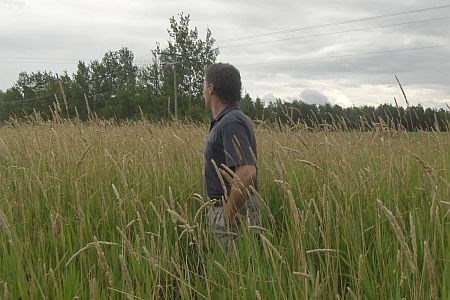The jury is still out on a bio-fuel trial to determine if two types of grass can be mixed in with wood waste to fuel Abitibi-Bowater's new biomass boiler in Fort Frances.
The Rainy River Future Development Corporation is chasing alternative energy opportunities with ongoing field trials of switch grass and reed canary to determine if area farmers can economically grow it for the pulp and paper producer.
Seven farmers are wrapping up the second of a three-year trial with 100 acres planted of each variety of grass.
The trials are a collaboration between AbitibiBowater, the Rainy River Future Development Corp. and the Emo Agricultural Research Station. The field trials will gauge which type of grass works best for a future pellet plant.
The company and its agricultural partners are far from producing any hard and fast business case.
It's been a challenge the last two years to plant and establish switch grass because of two successive damp summers.
“They don't call us Rainy River for nothing,” said Jeannette Cawston, Rural Agriculture Coordinator with the Rainy River Future Development Corp.
Switch grass is not native to the area, but reed canary grows in abundance in area ditches and can be used as cattle feed.
Though switch grass hasn't fully taken root, reed canary has flourished.
Martin Kaiser, AbitibiBowater's manager of strategic business development, said it is too early to draw any conclusions if either these grasses are suitable fuels because of the wet weather.
The company must also determine if it can handle agricultural fuel with their existing fuel-handling systems which are designed for woody biomass.
AbitibiBowater is intrigued by the possibilities because agricultural biomass has very low density and a low moisture content “which is really attractive to us,” said Kaiser.
There have not been any combustion trials of the switch grass or reed canary since last year's yield didn't prove very bountiful.
“We expect to harvest a small volume of those grasses this year and we'll be looking at (testing) them this year or early next year,” said Kaiser.
Though there have been two successively wet summer growing seasons, Kaiser said, there are a few fields that have done quite well.
The next step is to test the harvested grasses in the lab to better understand their combustion characteristics, mineral, moisture and ash content. They plan to approach Natural Resources Canada about doing some test burns in their small research boiler. “We're in the early stages of evaluating how we would do that,” said Kaiser.
AbitibiBowater's $84 million biomass boiler was built at the Fort Frances mill to wean the facility off the high-cost of natural gas.
It was a company's initiative was to investigate the feasibility of using agricultural products as a boiler fuel. “We want to make sure we have a secure and viable biomass supply source (locally),” said Kaiser.
The biomass boiler was first fired up last December. The woody biomass – sawmill residue and forest slash – was added in January.
Technicians have spent the last few months going through the boiler “optimization stage” to ensure it's running at peak performance.
“Part of this field trial is also understanding what are the costs of getting this delivered to the boiler site and into the system itself. We'll have a better understanding late this fall or early this winter,” said Kaiser.
Farmers are tracking their equipment and labour hours to help better understand their operating costs and the company will be working out potential transportation costs to bring the material in.
The company has conducted small scale trials burning and handling straw in the boiler as well as agricultural cubes (mixed types of straw compressed in a pellet form) to familarize themselves with the handling and combustion issues.
Kaiser said after talking with agricultural teams doing similar trials in Southern Ontario, the Rainy River trial may run past three years to allow the grasses to get firmly established and to get a better picture of the burning and handling processes.
The company is sharing the half the costs of the trial with the Rainy River Future Development Corporation by providing farmers with seed and fertilizer.
Cawston said it is undetermined how much will be harvested this fall, but it is predicted they may be able to get an acceptable four tonnes per acres of reed canary and an equivalent number of switch grass.
The Rainy River Future Development Corporation wants to expand agricultural opportunities since there are 65,000 to 70,000 acres of idle agricultural land in the district.
Cawston said the trials are a first step toward more trials to allow producers to see what commercial opportunities present themselves for pelletizing. In Europe, particularly Sweden, reed canary and grass pellets have been mixed with wood to heat people's homes for years. Other hays like alfafa and timothy can be sold to the pet food industry.
www.rainyrivervalley.ca/biofuel-trial-page.html




